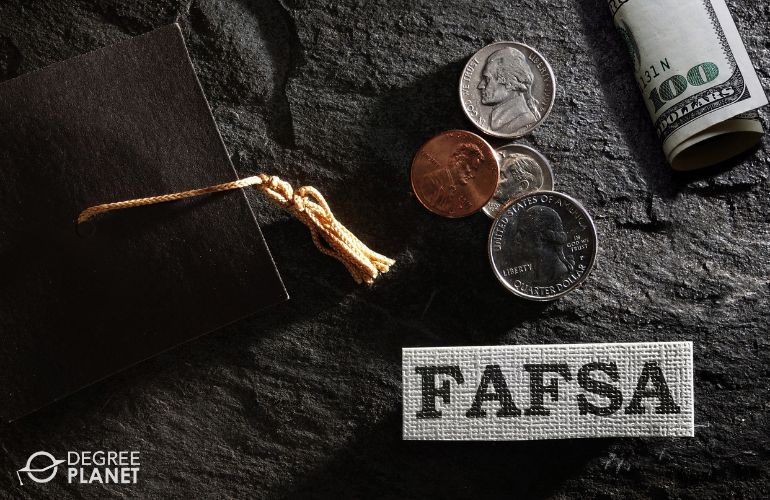A college education may be more attainable if you receive grants to go back to school. Grant money is available for students of all ages, including adult learners.

Your financial need may qualify you for a combination of grants from federal, state, and private sources.
Editorial Listing ShortCode:
If you are wondering how to fund your return to the classroom as a non-traditional student, you can take a look at the grant options that may be available to help with your tuition.
Grants to Go Back to School

College loans are handy, but you’re required to repay them after school. And don’t forget about the interest! If you’d prefer to get free college money that doesn’t need to be repaid, you may be in luck. That’s what college grants are for.
Grant money is given to students who could use an extra hand in paying for college. For that reason, most grant decisions are based on financial need. Grants come from a variety of sources. The federal government is a major provider of college grants for undergraduate students. States also run grant programs. So, too, do many colleges and organizations.
Editorial Listing ShortCode:
As an adult going back to school, you may be especially interested in grants for non-traditional students. That category includes:
- Single parents
- Students age 25 and up
- Veterans
- Workers who have lost their jobs or want to change careers
Some grant programs are aimed specifically at people in the above groups. Because of the targeted nature of such grants, you may face less competition for these awards.
When you file your FAFSA with the government, you’ll automatically be considered for federal grants. Your state may draw on that information, or there may be a separate application process for state grants. Your college will let you know how much you’ll be receiving. Private grant programs have their own application process that can vary from one program to another.
Grants are usually given on a year-by-year basis. Keeping your applications current may allow you to receive these funds throughout your time in college.
Common Types of Grants for Going Back to School

College grants come in multiple forms, and you may qualify for one or more types. Some common ones include:
- Federal Pell Grant. The federal government awards this grant to students who demonstrate financial need and are earning an undergraduate degree for the first time.
- Federal Supplemental Educational Opportunity Grant. Also known as FSEOG, this additional federal grant is reserved for the students with the greatest financial need.
- Private grants. Individual organizations—and colleges themselves—sometimes award a limited number of grants to students. These are similar to scholarships, but the recipients may be determined based on financial need rather than merit or other qualifications.
- State grants. Many states offer one or more grants programs that are similar to the federal options, such as grants that are open to all in-state residents with financial need and grants for people going into certain professions. You may be eligible to receive both state and federal funds if you meet the qualifications.
- TEACH Grant. If you’re an aspiring educator who’s willing to teach in a low-income school for several years, then the Teacher Education Assistance for College and Higher Education Grant from the federal government may be right for you. This grant can provide up to $4,000 per year, but if you don’t end up spending 4 years or more in a low-income district, the award will be converted into a loan that must be repaid.
While you may need to do some legwork to access private grants or state funds, filling out the FAFSA will automatically put you in the running for federal grant programs.
Grant Eligibility for Returning Students

To receive grant money, it’s necessary to meet certain criteria each year. Some common eligibility requirements include:
- Career plans. Some grants, such as the TEACH Grant, are only for people enrolled in teacher-licensure programs.
- Course load. For federal aid, you’re required to take at least 6 credit hours per semester.
- Degree level. Federal Pell Grants are for students earning their first bachelor’s degree.
- FAFSA completion. It’s necessary to fill out the FAFSA each year to maintain grant eligibility.
- Grades. Federal grants require maintaining a minimum GPA of 2.0.
- Incarceration status. People in state or federal prisons aren’t eligible for federal grants.
- Income. Most grant programs are based on financial need, so your household income may need to stay below a certain amount to maintain eligibility.
- School location. Some state grant programs require you to attend an in-state college.
Your school’s financial aid office can help you learn more about maintaining your eligibility for grant programs.
How to Apply for Back to School Grants for Adults

The better you understand the grant process, the more money you may receive. Here are some ways to apply for back-to-school grants for adults:
- Fill out the FAFSA. The Free Application for Federal Student Aid is the key to securing federal grant money. Other grant-awarding groups, including your state, may rely on this information as well.
- Check with your state. There may be additional steps required for state grant programs. You can check with your state’s student aid agency for assistance.
- Search online for private grants. The internet can be a valuable source of information about private grant programs. You may want to specifically search for educational grants for adults.
- Send applications. After picking out grant programs, you can follow the steps to submit applications. It’s essential to complete the applications thoroughly and send them in on time. If you don’t receive a response after a reasonable length of time, you might consider following up.
- Talk to the financial aid department. Your school’s financial aid professionals are there to guide you through the process. Plus, they’ll have information on institutional grants.
- Reapply as needed. Many grants must be renewed annually, so it helps to pay attention to how to maintain your eligibility.
Applying for grants will take time and effort, but it may pay off in the end.
Financial Aid and Scholarships

Grants are just one of the forms of financial aid available to qualifying college students. In addition to grants, there are state and federal loan programs for students. In fact, many students qualify for loans even if their income level excludes them from receiving grant money. Unlike grants, loans must be repaid with interest after completing school.
Some students also qualify for the federal work-study program. This allows them to earn tuition money through on-campus jobs. In addition to government programs, there are also school-sponsored grant and scholarship programs. Plus, private organizations offer such awards to students as well. Some employers also contribute to their employees’ educational pursuits.
Editorial Listing ShortCode:
Like many college students, you may be able to assemble a financial aid package that includes funding from multiple sources. The first step in the process is to submit the Free Application for Federal Student Aid (FAFSA).
What Is a Grant for College?

A grant for college is a form of need-based financial aid that students do not have to repay. It’s like getting free money to help with your college costs. You may be able to use your grant money to pay for tuition, room and board, books, or other educational expenses.
The federal government is a common source of grant money. States, colleges, and private organizations also distribute grants. Some grant programs are designed for certain groups of learners, such as grants for adult students. There are typically income guidelines for grants, and there may be other eligibility rules as well.
Can You Go to College at Any Age?

You can absolutely go to college at any age! Higher education is open to people from all walks of life. Some colleges do set 17 as the minimum age for enrollment. If you’re still in high school, you can look for schools with dual-credit programs. There are also colleges that accept early high school graduates.
As for adult learners, there’s no upper limit to when you can enroll in school. Many colleges welcome a diverse group of non-traditional students. There are even grants and scholarships for adults to make the idea more attainable for many would-be students like grants for moms going back to school. Some are very specific to a group like financial aid for single moms in particular.
Is There an Age Limit for FAFSA?

You can complete the FAFSA at any age. If you’re under the age of 13, you’re required to turn in a paper copy instead of completing the form online. Other than that, there are no age restrictions.
Although there aren’t age limits, there are other guidelines when it comes to grant eligibility. For instance, if you’ve already earned one bachelor’s degree, you won’t qualify for a Pell Grant. You may be able to get loans or participate in federal work-study, though. Plus, your state could have additional programs for which you might qualify.
Do You Have to Repay Grants for College?

One of the best things about getting education grants for adults is that this form of student aid does not need to be repaid. It’s like receiving free money for college.
There’s a caveat to this, though. It’s necessary to maintain eligibility or meet the requirements of your program. Otherwise, you may be expected to repay at least a portion of your grants. For example, anyone using the TEACH Grant is expected to work in a low-income school for several years after graduation.
Editorial Listing ShortCode:
If you don’t follow through with that commitment, the grant amount would be rolled into your student loans.
What’s the Difference Between a Grant vs. Scholarship?
Both grants and scholarships are free college money that adult learners can use for going back to school.
| Grants | Scholarships |
|
|
You might qualify to receive a mixture of grants and scholarships, so it could be worth applying for multiple awards.
Best Grants to Go Back to School
If you’re planning to go back to school, here are 20 grants you can explore.
- AAUW Career Development Grants – $2,000 to $20,000.
- Alliss Opportunity Grant – $350 – $1,100.
- Cal Grant – Up to $14,218.
- College Jumpstart Scholarship – $1,000.
- Federal Pell Grant – maximum of $6,895.
- Federal Supplemental Educational Opportunity Grant – $100 to $4,000.
- Georgia College Completion Grant – $2,500.
- Georgia Tuition Equalization Grant Program – $500 per semester.
- Go Grant – $300 to $3,000.
- Howard P. Rawlings Guaranteed Access Grant – Up to $20,200.
- Iraq and Afghanistan Service Grant – Equal to the amount of a maximum Federal Pell Grant.
- Jeannette Rankin National Scholar Grant – Unrestricted non-tuition grants.
- Minnesota State Grant – Minimum is $100 per year and the average is $2,603.
- Oregon Opportunity Grant – $3,000 to $8,000.
- Teacher Education Assistance for College and Higher Education Grant – Up to $4,000 a year.
- The New York State Tuition Assistance Program – Up to $5,665.
- Unigo $10K Scholarship – $10,000.
- Virginia State Grant – Up to $9,000.
- You Can. Go Back. Adult Student Grant – $2,000.
- Zell Miller Grant – Standard Undergraduate Tuition Rate
Each grant opportunity will have its own unique qualifications and application process.
Applying for Grants for Adults Returning to College

College can be expensive, but grants can be a powerful addition to your student aid package. There are government grants to go back to school for adults, plus colleges and organizations sometimes administer grants for students in need.
When applying to colleges, it’s beneficial to turn in the FAFSA. This form is often the access point for both state and federal grants. In addition, it’s strategic to discuss institution-specific grants with your school’s financial aid office. You can also search online for private grant programs.
If you’re eligible, you may have the opportunity to receive an assortment of grants to help fund your accredited college education.

